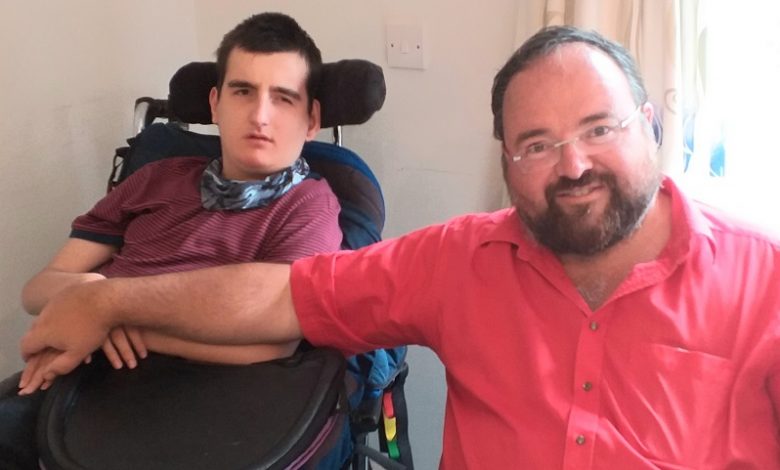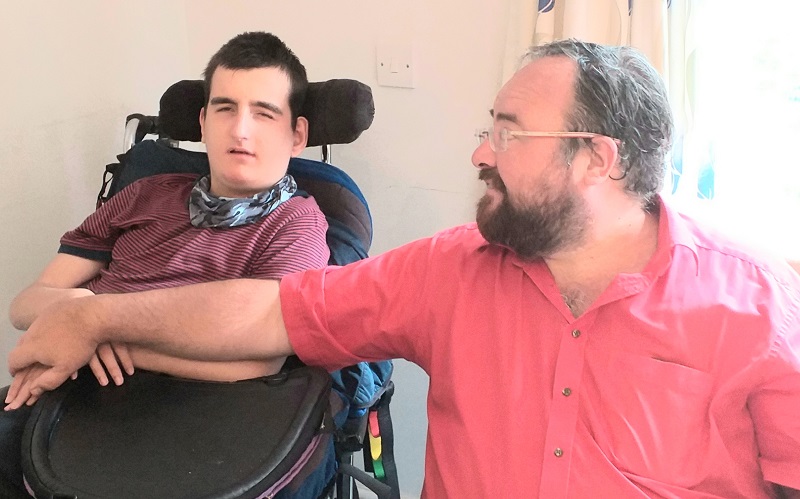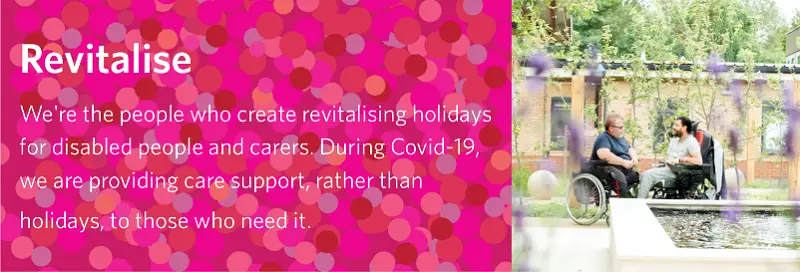
Coronavirus UK: considering respite options to help maintain care support
As the UK coronavirus lockdown continues, many disabled people and their families have already been self-isolating for weeks. One dilemma most have struggled with is maintaining care support during this time.
Co-founder Martyn Sibley recently wrote about his experiences and the possible solutions to care during the coronavirus outbreak. Here, Duncan Edwards shares his concerns and the plans he’s put in place to protect his family.
Share your tips and experiences with managing your care during self-isolation by tweeting @DHorizons or commenting on Facebook using the hashtag #CovidCarePlan.
On the morning of March 9th, I was casually browsing Twitter while getting my two boys ready and off to school in our usual routine. Having read a thread by an Italian doctor about the devastating consequences of Covid-19 in Italy, it left me feeling like I’d had a profound shock.
I was jolted into high alert about the seriousness of the coronavirus epidemic and the implications for my family.
One of my sons has Dravet syndrome and epilepsy. He has scoliosis, which means his lungs aren’t fully open, and has muscular and neurological problems that mean he can’t breathe deeply. He also uses a ventilator overnight because of sleep apnea.
He needs someone with him 24 hours a day to help with eating, positioning, washing, dressing and medical needs. This includes ‘rescue medicines’ for epilepsy. His epilepsy is complex and can get very serious, very quickly. Seizures can happen at any time.
Aside from my son’s needs, my wife has a spinal injury and has regular and long-lasting chest infections, so she too needs care support. You can read more about my family and background in a recent article for Disability Horizons.
Because of our situation, I was extremely worried about the pandemic. If the UK followed the same path as Italy, I feared that it might be hard for my son and wife to get into a hospital or the help they needed.
From that morning, we started preparing for all eventualities and self-isolating, with the view to never leave the house for the foreseeable future.
Self-isolating our family
The first thing we did was to stock up on extra food. This was about a week before the panic buying started. There has been a lot of criticism about people ‘stockpiling’, but I feel no guilt because of our situation.
We bought extra-long life food and tins, and I’m glad we did because the following week we were notified by the Dravet Syndrome Charity that our son is in a higher risk group and should stay at home for 12 weeks.
Since then we have been relying on deliveries. Initially, these were from Tesco, until it was overwhelmed and we couldn’t get any delivery slots. Now we rely on smaller local suppliers, but that hasn’t been easy either.
Organising care support for my family’s needs

Our family relies on external carer support for a ‘normal’ family life. My son has overnight care to help monitor and adjust his ventilator and breathing mask. He cannot do this himself and the oxygen levels in his blood drop dangerously without it.
As my wife also needs assistance with some tasks, it is impossible for me to help both of them, let alone also have a working day or any leisure or family time!
I was immediately worried that the pandemic would mean we’d have less or, in the worse case, no care at all, especially if either of them got ill.
At the time, there was no guidance on whether care would definitely continue as normal and how PPE should be used.
Being part of the higher risk group also means that my son cannot attend a school or the current regular ‘short break’ care that he enjoys. So all his care now needs to be done at home.
Because of my son’s needs, our carers have to have a particular range of skills and training, and it is not easy to find people to help. Our agency has been very helpful in arranging extra daycare from our existing regular helpers. But what if they can’t work for whatever reason? And how does that impact on the support for my wife?
What if someone becomes ill with coronavirus?
Two of our support team have small children and have had to isolate for 14 days when their children have fallen ill – with the ordinary sniffles or Covid-19, who knows?
I have, therefore, had to cover some night and day-shifts when care has not been available. Alongside that, I still have to prepare myself and save my energy for a time when one of us may get infected.
But, I cannot do all the care myself long-term. It is impossible for any period longer than a day or so, so having no care support for any of my family is not an option.
In addition, I worry about us getting ill. Although as a family we are completed isolated – not going out and receiving everything via courier delivery left outside – we still have ‘leaks’. Inevitably, the carers that are coming in are still going to supermarkets and have contact with other family members etc.
As having the virus can be completely asymptomatic, where you don’t display symptoms at all, or you can be infectious for several days before symptoms show, we could still be having help from infected people.
I know and trust all our carers that they are being extra careful, but there are still risks. The agency has reduced the number of clients that each carer visits so for the most part our son is the only client they are seeing.
We have also started using PPE at home (masks, aprons and gloves) and have been disinfecting door handles, the light switched etc regularly, as well as other cleaning tasks.
Visit the Disability Horizons Shop to buy PPE for yourself or carers.
Back-up plans for care
Although we are managing, I do worry about what will happen if all our care support is stopped, for whatever reason, and if any of our household becomes ill. It would also be dangerous for me to care for my wife and/or son if I have the illness.
There is a possibility that we could get live-in support from an agency to help. But I do not know how quickly this could be arranged. We also have some family who could help if it was absolutely needed.
Another option is a respite centre for a short period, such as Revitalise. Having learnt about the charity through Disability Horizons, I spoke to the team there to understand how it works.
It has given two of its three centres to the NHS for patients who can’t go home because they need care support, but don’t need to be in the hospital anymore.
Its third centre in Southport is offering reduced-rate accommodation for disabled people who need help during this time.
Revitalise offers guaranteed care 24 hours a day as well as all meals, removing any worries about missing care or dwindling food supplies.
The charity is travelling all over the country to collect people who are in need of urgent support and setting up packages with its staff. It also offers funding to help pay for stays.
Unfortunately, my son is too young to go there as it’s for young people ages 18+ and adults. But I could certainly see it suiting a lot of families that need help at this very difficult and worrying time.
For a family in a similar situation to me, it would alleviate pressure and mean knowing your loved one is out of harm’s way and safe.

Revitalise could also be a good option for a family or care support team that needs a break. For example, at the moment, our carers are working as much as they can. I have had little time off either.
Our staff usually take holidays while our son is at respite care or Rainbows, which is also now closed and being used for NHS emergency care.
People are able to cope with no holiday for a short time. But if this situation goes on for months, using somewhere like Revitalise for a short time would also give everyone a break.
And when all of this is over and my son is old enough, Revitalise is definitely somewhere I will be looking at for a respite option for him or as a family.
This article was sponsored by Revitalise, a charity that has accessible holiday centres across the UK, offering fully catered breaks for disabled people and their families.
During the coronavirus outbreak in the UK, Revitalise is offering discounted stays to disabled people so that all care and food is taken care of.
By Duncan Edwards
Tell us about your experiences with self-isolation. How are you managing your care? Have you been able to buy personal protective equipment? Are you having issues with funding? Share your tips and experiences on Twitter @DHorizons or Facebook using the hashtag #CovidCarePlan.
More on Disability Horizons…